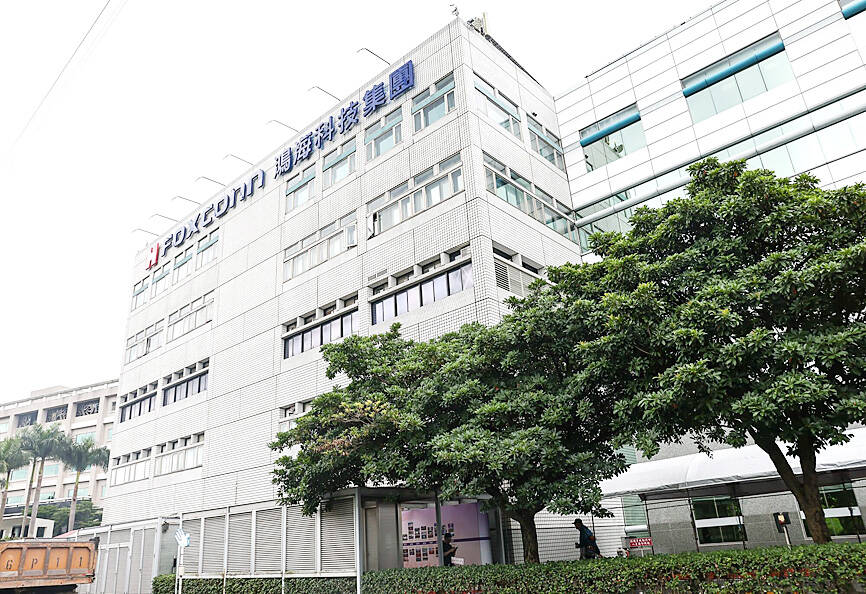Apple Inc’s major manufacturing partner Hon Hai Precision Industry Co (鴻海精密) reported its slowest monthly sales growth since February, stoking concerns about demand momentum for artificial intelligence (AI) infrastructure and iPhones.
Hon Hai, also a key server assembly partner to Nvidia Corp, yesterday reported sales of NT$804.85 billion (US$25.18 billion) for last month, up 8.59 percent year-on-year and marking the highest October level in the company’s history.
Analysts expect the company to grow its sales by 15 percent to NT$2.13 trillion this quarter.

Photo: Cheng I-hwa, Bloomberg
Hon Hai’s revenue in the first 10 months of this year was NT$5.53 trillion, up 9.57 percent year-on-year and the highest for the period on record, company data showed.
The iPhone assembler’s tepid sales growth appeared to reinforce Apple’s weak forecast for the holiday quarter.
“Looking ahead to the fourth quarter, operations are anticipated to show both quarterly and yearly growth,” Hon Hai said in a statement, without giving details.
Hon Hai and other hardware suppliers are riding a wave of spending on servers and data centers from big tech firms including Meta Platforms Inc and Alphabet Inc’s Google.
However, questions are bubbling up about how long the spending will last without a killer AI application to justify the large infrastructure investments.
Still, the capital expenditures of the four largest Internet and software companies — Alphabet, Amazon.com Inc, Meta and Microsoft Corp — are set to climb to well over US$200 billion this year, a record sum for the group.
Executives from each company told investors recently that they would continue to spend large sums next year.
Separately, Hon Hai subsidiary ShunSin Technology Holdings Ltd (訊芯科技) is seeking a permit to invest US$80 million in northern Vietnam to produce integrated circuits, Reuters reported on Monday, citing a document from the Vietnamese Ministry of Natural Resources and Environment.
The proposed plant in Bac Giang Province would focus on producing and processing electronic components, specifically IC boards, the document said.
ShunSin plans to begin operations at full-scale in December 2026, with annual capacity of 4.5 million units, it said.
All products from the Vietnam ShunSin plant would be for export to the US, the EU and Japan, the document added.
Hon Hai already has major operations in Vietnam and has invested more than US$3.2 billion there since fist entering the Southeast Asian country in the 2000s. Most of its manufacturing plants are in the northern provinces of Bac Ninh and Bac Giang.
Additional reporting by Reuters

MULTIFACETED: A task force has analyzed possible scenarios and created responses to assist domestic industries in dealing with US tariffs, the economics minister said The Executive Yuan is tomorrow to announce countermeasures to US President Donald Trump’s planned reciprocal tariffs, although the details of the plan would not be made public until Monday next week, Minister of Economic Affairs J.W. Kuo (郭智輝) said yesterday. The Cabinet established an economic and trade task force in November last year to deal with US trade and tariff related issues, Kuo told reporters outside the legislature in Taipei. The task force has been analyzing and evaluating all kinds of scenarios to identify suitable responses and determine how best to assist domestic industries in managing the effects of Trump’s tariffs, he

In a small town in Paraguay, a showdown is brewing between traditional producers of yerba mate, a bitter herbal tea popular across South America, and miners of a shinier treasure: gold. A rush for the precious metal is pitting mate growers and indigenous groups against the expanding operations of small-scale miners who, until recently, were their neighbors, not nemeses. “They [the miners] have destroyed everything... The canals, springs, swamps,” said Vidal Britez, president of the Yerba Mate Producers’ Association of the town of Paso Yobai, about 210km east of capital Asuncion. “You can see the pollution from the dead fish.

TIGHT-LIPPED: UMC said it had no merger plans at the moment, after Nikkei Asia reported that the firm and GlobalFoundries were considering restarting merger talks United Microelectronics Corp (UMC, 聯電), the world’s No. 4 contract chipmaker, yesterday launched a new US$5 billion 12-inch chip factory in Singapore as part of its latest effort to diversify its manufacturing footprint amid growing geopolitical risks. The new factory, adjacent to UMC’s existing Singapore fab in the Pasir Res Wafer Fab Park, is scheduled to enter volume production next year, utilizing mature 22-nanometer and 28-nanometer process technologies, UMC said in a statement. The company plans to invest US$5 billion during the first phase of the new fab, which would have an installed capacity of 30,000 12-inch wafers per month, it said. The

Taiwan’s official purchasing managers’ index (PMI) last month rose 0.2 percentage points to 54.2, in a second consecutive month of expansion, thanks to front-loading demand intended to avoid potential US tariff hikes, the Chung-Hua Institution for Economic Research (CIER, 中華經濟研究院) said yesterday. While short-term demand appeared robust, uncertainties rose due to US President Donald Trump’s unpredictable trade policy, CIER president Lien Hsien-ming (連賢明) told a news conference in Taipei. Taiwan’s economy this year would be characterized by high-level fluctuations and the volatility would be wilder than most expect, Lien said Demand for electronics, particularly semiconductors, continues to benefit from US technology giants’ effort